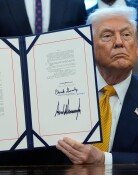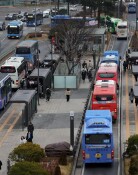[Opinion]Government Subsidy is Not Salary
[Opinion]Government Subsidy is Not Salary
Posted June. 21, 2001 09:46,
![[Opinion]Government Subsidy is Not Salary](https://dimg.donga.com/egc/CDB/ENGLISH/Article/20/01/06/22/2001062219028.jpg)
The political circles changed their attitude after they were blamed for the exclusion of political fund from the money laundering prohibition list. Meanwhile, the examination result on the government subsidy financial report reveals that it is urgent to reform the subsidy system. It has been revealed that for last year alone, each political party illegally used the government subsidy of 51.6 billion won tax money without the proper documentary evidence.
According to the examination result, one can easily see that the current subsidy system ridiculously incurs the bureaucratization and appropriation of the parties, rather than healthy development of the parties. Last year, the party membership fee of the three parties, the Millennium Democratic Party (MDP), the Grand National Party (GNP), and the United Liberal Democrats (ULD), occupied mere 4.8 percent, while the subsidy’s portion was 39.6 percent of their total income. Current system made it difficult to achieve their financial autonomy by restraining each party to mainly rely on the government subsidy. Each party used to depend on the subsidy which has become a natural trend. They wouldn’t think of collecting more money from the party members.
The subsidy has been skyrocketed under the logic that the subsidy should be able to cover the actual demand of political funds to prevent political corruption. Although the total amount of the subsidy was only 1 billion won in 1988, it will be 113.9 billion next year. It is 100 times more money than the first subsidy. It has happened because the system allows lawmakers, the actual beneficiaries of the subsidy, to increase the amount of the subsidy without limit.
The government subsidy is also being used as the operating cost for the parties, such as salary, inducting the parties’ bureaucratization. The examination result shows that each party illegally transferred the policy development expenses into salary under the name of `policy activity expense` for employees of the clerical office. They still argue that they are observing the rule that regulates each party to spend 20 percent of the subsidy as the policy development expenses. The parties even disguised the employees of their clerical offices as the policy specialists.
Since the current system does not regulate the way of using the subsidy, the heads of the parties can use the money for private purpose making their own private parties. A party reported that 80 million won were used to make calendars for which their honorary presidents` writings and paintings. There have been many other cases of using the subsidy for private purposes.
The government subsidy system was designed to prevent corruption against political funds and unnecessary competition caused by the difference among parties’ monetary ability. It was designed to help democracy to take root under current situation in which not many electorates or members of the parties voluntarily donate their money. However, current system is not functioning appropriately because of the excessive pattern of subsidy increase led by lawmakers, reckless use and lack of strict auditing, and distribution method without principle. The immoral trend in which the subsidy, which is basically tax money, is used for private purpose rather than public good should be gone. It is worthwhile to consider adoption of the `matching fund` system in which the subsidy is given according to the total amount of a party’s membership fee. The `rump-sum tax-deduction system`, in which tax payers can donate a part of their tax at the end of a year, is also recommendable.
More stringent audit on political funds including the government subsidy should be conducted. Accurate treasurers report is also necessary to increase the transparency level on expenditure of the subsidy. Thus far, the parties have never been audited while they were spending the subsidy, which is precious tax money. And they have never been sanctioned upon the illegal use of the subsidy for last 20 years. Periodical audit by the National Election Commission and the Board of Audit and Inspection of Korea should be carried out. In case of false report, illegal expenditure, or unreliable documentary evidences, heavier sanctions, such as stoppage of the subsidy and cutting off of the amount, should be considered.
Lastly, since the subsidy system is a part of the political fund system, when adoption of a new system or reformation on the system takes place, it should be discussed with a reform plan on whole political fund systems including private donation system such as the supporters’ association. Therefore, the current political fund system must be reformed considering the securing of the transparency and justice of the political funds, scraping out of corruption related with the political funds, preventing of the parties bureaucratization and privatization, encouraging of the parties’ policy development and parliamentary activities, and the correction of the crippled expenditure of the political funds.
Kim Yong-Ho (Hallym University. Political Science Department, guest editorialist) kimyh@hallym.ac.kr







